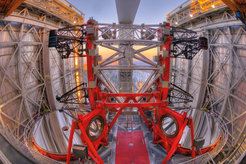About Us

The Max Planck Institute for Astronomy (MPIA) seeks to reveal the nature of our universe, investigating everything from planets and stars to galaxies and black holes. To support this mission, we carry out observational and theoretical research, design and manufacture instrumentation for telescopes, train junior researchers for careers in astronomy and beyond, and communicate our results to the scientific community and general public. We also strive to create a work environment at MPIA that is intellectually engaging, well-organized, and welcoming and inclusive for our diverse, international community.
The History of our Institute
MPIA was founded in 1967, with the goal of providing German astronomers top-quality observational facilities. Since then, MPIA has played a major role in designing, operating, and building instrumentation for telescopes, starting with co-founding the Calar Alto observatory in Spain. MPIA has also built instruments for the Large Binocular Telescope, Very Large Telescope (VLT) and Extremely Large Telescope (ELT) in Chile. MPIA has also been at the forefront of space-based astronomy, contributing to the Infrared Space Observatory (ISO), the Herschel Space Telescope, and the flagships James Webb Space Telescope (JWST) and the Nancy Grace Roman Space Telescope.











